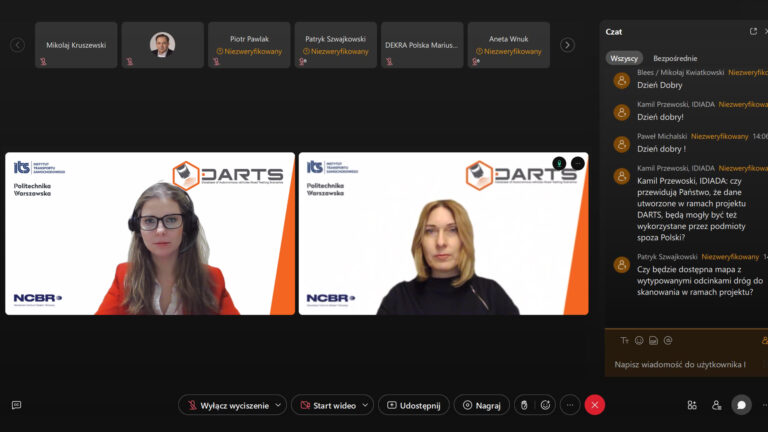Blog
1st DARTS-PL Seminar – Summary
On December 14, 2023, the 1st DARTS-PL Seminar was held, during which the first effects of the project “Database of Autonomous vehicles Road Testing Scenarios”, financed by NCBiR under the GOSPOSTRATEG program, were presented. The main topics of the meeting were infrastructure aspects and road traffic safety. The seminar was attended by numerous representatives of scientific units, universities, research institutes and entrepreneurs who produce elements of driving automation systems, deal with software and test autonomous solutions.
On behalf of the Ministry of Infrastructure, the seminar was attended by Sławomir Lewandowski, Counselor in the Department of Transport Strategy, who, as an introduction, pointed to the role of the ministry as the initiator of activities aimed at starting the implementation of the project and, at the same time, the entity authorized to dispose of its products. The primary goal of the Ministry when launching the project was to take action to stimulate the market in the area of transport autonomy. Creating a database of scenarios for testing driving automation solutions based on the national infrastructure is an ambitious and multi-threaded activity, therefore it requires knowledge from many fields and activity on the market.
The great interest in the project’s products is highly expected. The database is said to be used in practice, helping manufacturers to adapt their ideas for automation solutions to real conditions. From the Ministry’s point of view, the database will be used to verify current regulations and infrastructure solutions.
The subject of the project and its basic assumptions were then introduced to the audience by the project manager, prof. Marcin Ślęzak.
The DARTS-PL project has been implemented since December 2022 by a consortium consisting of the Motor Transport Institute (ITS) and the Warsaw University of Technology (PW). The aim of the project is to develop an original database of test scenarios for autonomous vehicles (AV), taking into account road conditions typical of Poland. The database will constitute the basis for the design, development, testing and evaluation of L3-L5 vehicle perception systems according to SAE J3016.
In the project ITS is developing a methodology for selecting measurement sites, performing measurements in selected scenarios, providing comprehensive metadata and promoting the project. PW includes IT competences necessary at the stage of data processing of registered scenarios, data filtration and fusion, implementation of semi-automatic annotation generation algorithms, scenario annotation, preparation of infrastructure and software for dissemination of the scenario database.
The next speaker, Piotr Pawlak, PhD, presented the results of the first analysis prepared as part of the DARTS project. The presentation concerned infrastructure issues, in particular road solutions, which are important for vehicle perception systems. When implementing such a large project, it was necessary to analyse road infrastructure that would be taken into account when mapping specific road sections. Four voivodeships have been selected as main measurement sites: Masovia, Łódź, Greater Poland and Lesser Poland.
Monika Ucińska, MA, presented to the seminar participants how to select test sites taking into account frequency of road accidents. Among 100 reference infrastructure sections, 60 are conditions typical of Poland and places with a high accident rate (40 sections must reflect atypical cases, e.g. traffic jam, traffic disruptions caused by an accident, a pedestrian crossing with and without traffic lights, the passage of an emergency vehicle). For this purpose many analyses were carried out. Specific poviats in the selected four voivodeships were taken into further consideration. Within them specific places seem problematic for humans (e.g. due to the frequency of accidents), so they may potentially also prove problematic for autonomous driving systems.
The last speaker was a special guest – Mariusz Mankiewicz, President of the Management Board of Dekra Polska Sp. z o. o., who presented the results of road tests conducted by Dekra regarding the emergency braking assistant. The impact of proper camera calibration on the operation of the AEB system was examined. It was highlighted that when entering the vehicle, the driver assumes all implemented features are working properly. Drivers do not take into account the situation in which the system is incorrectly calibrated. In an experiment performed by Dekra camera settings were slightly changed and a series of braking tests were carried out in different scenarios, at different speeds. This resulted in AEB improper operation. The research has shown that some systems are very sensitive to the driver’s interactions, the systems react differently depending on the driver’s behaviour (e.g. emergency braking is interrupted). According to the demands formulated by Dekra, ADAS systems:
- must be technically efficient throughout the entire period of use of the vehicle,
- must be able to analyse complex road situations and respond appropriately,
- before being put into production, they should be independently tested and the evaluation criteria regularly updated.
The innovation of the DARTS project results from the nature of the reference data, which is characterized by great diversity and a high level of detail. Moreover, the project fits into numerous development strategies, e.g. national smart specializations (KIS10) and is a response to socio-economic demand, enabling the Polish economy to develop based on new technological trends. The effect of the project is to be a database available to everyone, supporting enterprises in testing their own algorithms, which may translate into the strengthening and development of the Polish economy.
The next DARTS-PL project seminar will take place in March 2024. We cordially invite you today!
***
The DARTS project – Database of Autonomous vehicles Road Testing Scenarios is financed by the National Center for Research and Development under grant agreement no. GOSPOSTRATEG-VIII/0001/2022.


